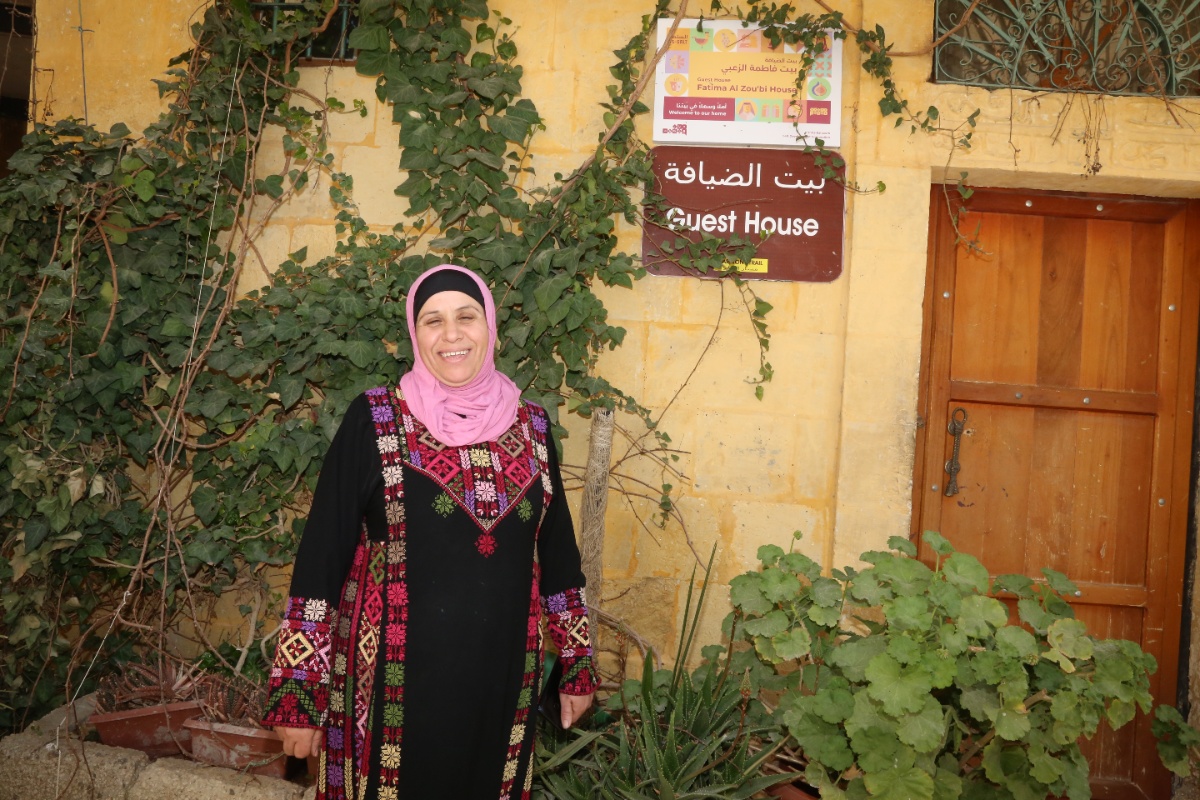By Eman Abu Qao’od
Visited by both locals and tourists wishing to taste traditional Jordanian food, to wear Al-Khalqa (traditional Salti dress) and to enjoy the beautiful house decorations, “Fatima Alzoubi House” has become one of the most prominent locations in the city of Salt. The brainchild of Fatima Alzoubi, this venture saw her transform a kilogram of lentils, 70,000 grains, into a touristic project whose goal is to prepare traditional food and make the house a landmark of the city.
The project took off 20 years ago when Fatima became the breadwinner for herself and her five children, the oldest in the tenth grade, the youngest in the first. She had to face life on her own, and she did.
Speaking to Al Nahda Women Network, she said: “I do not have a degree or experience in any field of work, so I had to seek the help of a charity. The president’s response to me was that I did not need aid as I was able to work. I was sad and helpless. I told my neighbor who suggested working in preparing stuffed vine leaves for money or cleaning grains, such as lentils, rice, and bulgur, for neighbors. I had my first pay of JD1.5 and was the first woman in Salt to do so, defying the culture of shame and traditions.”
Teachers and working women started resorting to her services in preparing food. Home kitchens were not a trendy idea back then, and Fatima worked hard for seven years.
“After seven years of preparing food, a local organization, the ‘Jordanian National Forum for Women’, asked me to prepare meals for the wives of Arab and foreign ambassadors visiting Salt. I prepared nine types of traditional dishes and salads that were served in the well-known tourist place, ‘Abu Jaber Museum’. I later worked as a cook at the restaurant of an organization .”
A turning point was provided by the visit of a Ministry of Tourism delegation who informed her that her house is on Salt’s tourist route. They suggested she host tourists and provide traditional Salti food and Al-Khalqa in exchange for payment.
Fatima’s children completely rejected the idea. “How are we going to host strangers?!” Yet, she worked relentlessly to convince them and sought her neighbors’ advice to make sure she preserves the area’s traditions. Her neighbors encouraged her; a few started helping out with cooking and get paid for it.
Fatima recalls the first visit, that of a Japanese delegation: “I had no sleep that night. I began cooking and preparing. I was paid JD120, which was a lot for me; it was my biggest pay ever.”
Fatima’s project became a tourist attraction and was visited by Queen Rania Al Abdullah, who is the biggest supporter of productive projects, as well as by the queen of the Netherlands and many political, social, cultural, and international figures. She is the proud recipient of a certificate of quality granted by the Royal Scientific Society for her ghee, cheese, Makdous (stuffed and pickled eggplant), and pickles. She now aims at expanding her project “With willingness and determination, every woman is capable of facing challenges. No matter the circumstances, a woman can be independent and confident.”
Al Nahda Women Network functions under the umbrella of the Arab Renaissance for Democracy and Development (ARDD) and strives to highlight women’s success stories in different areas and shed light on the challenges they face through a series of articles published on social media. This story is part of a series of blogs under ‘For Us by Us Project’ implemented in cooperation with Heinrich-Böll Stiftung Palestine/Jordan Office


